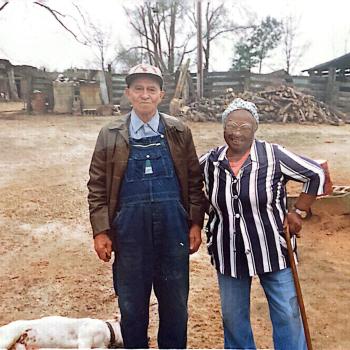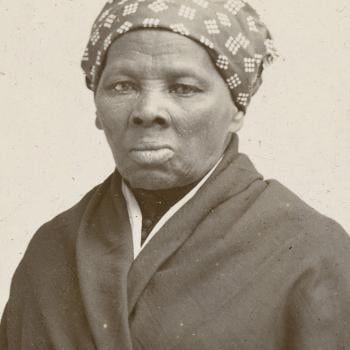Lectionary Reflections: Year A
Fourth Sunday in Lent
April 3, 2011
1 Samuel 16:1-13
It is always a bit dangerous to wade into the waters of a highly complex ocean of a story like the one that covers the enormous biblical range of 1 Samuel, 2 Samuel, and the beginning of 1 Kings. It is fair to say that this extraordinary tale of power politics, difficulties of family, and the future of the people of Israel has too often been reduced to flannel board simplicity. Samuel, God's prophet, is good; Saul, Israel's first king, is bad; and David, a "man after God's own heart," is very good. A careful reading of the long story, however, calls into question each of those too simple claims.
One very brief article, discussing a part of one chapter in the saga, cannot address all these complexities, but we can look with care at this important story of David's surprising, private coronation by Samuel right in the midst of all of his brothers in the tiny sheepherding town of Bethlehem.
The context is valuable. Saul, Israel's first king, has just been publically humiliated and deposed as king by the mighty prophet, Samuel. The reasons for Samuel's rejection are contested. He has asked Saul to "annihilate" (the infamous cherem in Hebrew) the Amalekites, because of their opposition to Israel after their escape from Egyptian slavery. The reference is to Exodus 17:8-16. Saul proceeds to do precisely that, except that he saves both the king of Amalek along with the very best of his livestock in order, as he says twice, to "sacrifice to YHWH" in Gilgal, the sacred and central sanctuary (1 Sam. 15:15, 21). Samuel rejects Saul's reasoning, claiming that YHWH had commanded annihilation "until they are consumed," on the battlefield (vs. 18). That is not what he first claimed YHWH had commanded in verses 2-3.
Nevertheless, Saul is deposed from his kingship (vs. 26) by what Samuel judges is a transgression of YHWH's command, and Samuel is then called by YHWH to go to Bethlehem to find another king. YHWH first accuses Samuel of "grieving" too long over Saul," though it seems hard to believe that Samuel would feel any remorse about the fallen Saul so soon after rejecting and humiliating him (1 Sam. 16:1). Nonetheless, YHWH's express command to Samuel is to fill his sacred horn with the oil of anointing and to go to Bethlehem, a tiny place just south of the then-Jebusite Jerusalem, because YHWH has found a new king there among the sons of Jesse.
Surprisingly, Samuel, the mighty prophet fresh from a public victory over Saul, now professes that he is terrified of that same Saul and is reluctant to go (vs. 2). But YHWH has a plan. Samuel is to pretend to be in Bethlehem "for a sacrifice to YHWH." He then will invite Jesse to the sacrifice and await a sign that will reveal the new king (vs. 3). Samuel, thus assured by his God, takes a heifer for sacrifice and goes to Bethlehem. The elders of the town, obviously aware of the confusing confrontation between their king, Saul, and their ancient prophet, Samuel, at the hill of Gilgal, are fearful at the prophet's presence in their town. They ask him if he has come in shalom, and he assures them that he has. He then turns to Jesse and his sons, demanding that they join him at the place of sacrifice after proper preparation (vs. 5).
Samuel takes one look at Jesse's oldest boy, Eliab ("my God is a father"), and decides, "Surely, YHWH's anointed one stands here before YHWH" (vs. 6). But the voice of YHWH quickly begs to differ. "Do not look on his appearance, or on the height of his stature, because I have rejected him." In effect, YHWH says, "No more tall guys!" Samuel's and YHWH's earlier choice of the tallest man in Israel, Saul, has not worked out. It should also be noted that Samuel is hardly the best judge of character, because his immediate decision to choose still another tall son of Israel is plainly not to be trusted. Is Samuel as prophet all that aware of his choices? Still, YHWH goes on to utter perhaps the most famous lines in all the story of Saul. "YHWH does not see as mortals see; they look on the outward appearance, while YHWH looks at the heart" (vs. 7).
That line is beloved of many a preacher, and more than a few overly romantic sermons have been the result. "We should judge all people not by the way they look, but by their hearts, as God does" has probably been preached from several thousand pulpits more than once. And a good sentiment it is, too. However, is it quite as simple as all that? At least it could be said that Samuel is now more wary of the possible choices before him; he in quick fashion rejects the succeeding six sons of the increasingly confused Jesse. "Any more sons?" asks the impatient, and equally confused, Samuel. "One more," answers the old man, "the youngest, but he is keeping the sheep" (vs. 11). "We will not sit down until he comes," says the prophet, probably in his best sepulchral tones so as to increase the drama of the anointing to come.





